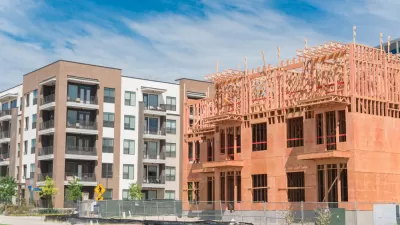When a region isn't building enough housing to meet the demands of a growing population and shifting demographics, zoning codes reform and infrastructure investment can be the solution.
"Regional Plan Association, HR&A Advisors Inc., and the Rauch Foundation released new research this week highlighting the high demand for multifamily housing on Long Island," according to a post on the Regional Plan Association website.
"The report, funded by the Rauch Foundation as part of the Long Island Index, uses RPA’s regional population projections to estimate future housing demand on Long Island, and suggests possible strategies for creating an adequate supply of new housing"
The report concludes that cities and counties on Long Island have been building fewer multi-family residential units than required by a growing population. Even taking into account a recent increase in the number of multi-family units constructed, the pace of construction will only meet 40 percent of the anticipated need by 2030. The report also found that much of the recent building that has been completed doesn't meet the changing preference of Americans toward housing in preferable, mixed-use communities. "RPA estimates that the population of 25 to 44 year olds in Long Island could increase by 17% in the next 15 years, an age group that prefers areas with amenities, walkability and character," according to the post.
The report includes recommendations for zoning and planning policy that could enable more of the kinds of housing it predict the region will need in the future.
FULL STORY: New Report Quantifies Long Island’s Housing Needs, Offers Solutions

Planetizen Federal Action Tracker
A weekly monitor of how Trump’s orders and actions are impacting planners and planning in America.

San Francisco's School District Spent $105M To Build Affordable Housing for Teachers — And That's Just the Beginning
SFUSD joins a growing list of school districts using their land holdings to address housing affordability challenges faced by their own employees.

The Tiny, Adorable $7,000 Car Turning Japan Onto EVs
The single seat Mibot charges from a regular plug as quickly as an iPad, and is about half the price of an average EV.

Seattle's Plan for Adopting Driverless Cars
Equity, safety, accessibility and affordability are front of mind as the city prepares for robotaxis and other autonomous vehicles.

As Trump Phases Out FEMA, Is It Time to Flee the Floodplains?
With less federal funding available for disaster relief efforts, the need to relocate at-risk communities is more urgent than ever.

With Protected Lanes, 460% More People Commute by Bike
For those needing more ammo, more data proving what we already knew is here.
Urban Design for Planners 1: Software Tools
This six-course series explores essential urban design concepts using open source software and equips planners with the tools they need to participate fully in the urban design process.
Planning for Universal Design
Learn the tools for implementing Universal Design in planning regulations.
Smith Gee Studio
City of Charlotte
City of Camden Redevelopment Agency
City of Astoria
Transportation Research & Education Center (TREC) at Portland State University
US High Speed Rail Association
City of Camden Redevelopment Agency
Municipality of Princeton (NJ)





























